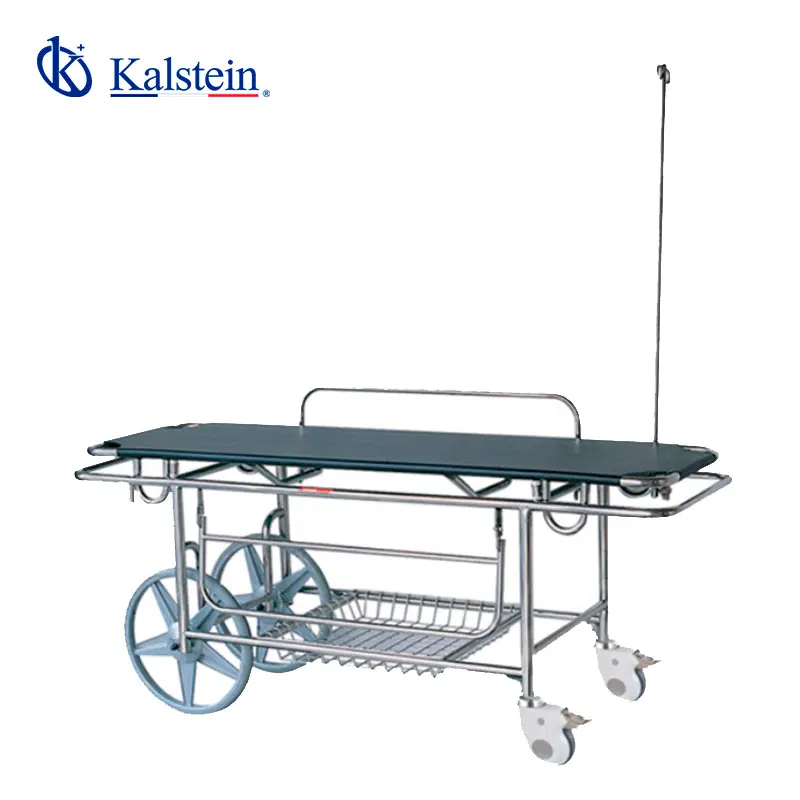In the medical field, choosing the right equipment is crucial to ensuring efficiency in patient treatment and accuracy in medical tests. Stainless steel 304 emergency stretchers are essential in this category, offering durability and ease of disinfection.
In this article, we will compare the stainless steel 304 emergency stretcher from Kalstein’s medical line with its main competitors, highlighting the advantages and disadvantages of each to help make an informed decision.
If you’re seeking a blend of innovation and quality, you’ve come to the right place. At https://kalstein.it/category-product/medical-line/medical-transfer-stretcher/ we offer you the luxury to explore our exclusive catalog of laboratory equipment. We manufacture each piece of equipment with a level of excellence. Our intuitive and agile online shopping channels are designed for your convenience, ensuring the friendliest prices. Don’t hesitate any longer, we bring science to life, it’s time to become part of our community. https://kalstein.it/
Kalstein: Innovation and Durability
Kalstein has established itself as a leader in the manufacturing of medical equipment, and its stainless steel 304 emergency stretcher is no exception. This stretcher offers a combination of robustness and functionality, designed to withstand the most demanding conditions in hospital environments.
Advantages:
-
Durability and Strength: Made from high-quality stainless steel 304, this stretcher is resistant to corrosion and wear, ensuring a long lifespan.
-
Ease of Maintenance: The stretcher’s design allows for easy cleaning and disinfection, crucial in medical environments to prevent infections.
Disadvantages:
-
High Cost: Quality and durability come at a price, and this stretcher can be more expensive than other options on the market.
-
Weight: The sturdiness of the material means the stretcher can be heavier, which might make it more difficult to handle in certain situations.
Smith & Nephew: Advanced Functionality
Smith & Nephew is another prominent name in the field of medical equipment. Their stainless steel 304 emergency stretcher stands out for its ergonomic design and advanced features.
Advantages:
-
Ergonomic Design: The stretcher is designed with the comfort of the patient and ease of use for medical staff in mind.
-
Advanced Features: It includes features such as height adjustment and multiple positions, facilitating patient treatment and transport.
Disadvantages:
-
Cost: Similar to the Kalstein stretcher, the advanced functionality comes at a high price.
-
Complex Maintenance: The multiple functions and moving parts may require more frequent and specialized maintenance.
Hill-Rom: Comfort and Safety
Hill-Rom is known for its solutions focused on patient comfort and safety. Their stainless steel 304 emergency stretcher combines these elements effectively.
Advantages:
-
Patient Comfort: The stretcher includes mattresses and supports designed to maximize comfort during transport.
-
Safety: Equipped with efficient locking systems and brakes, these stretchers ensure stability during use.
Disadvantages:
-
Weight and Size: Despite its safety features, these stretchers can be bulky and difficult to maneuver in confined spaces.
-
High Cost: The combination of comfort and safety raises the price of this stretcher, placing it in the higher range of the market.
Medline: Efficiency and Accessibility
Medline focuses on offering accessible solutions without compromising quality. Their stainless steel 304 emergency stretcher is a popular choice among medical centers looking for efficiency and cost-effectiveness.
Advantages:
-
Accessibility: Medline offers a stretcher at a more affordable price compared to other competitors, without sacrificing quality.
-
Efficiency in Use: Its simple yet effective design allows for quick and easy use, ideal for emergencies.
Disadvantages:
-
Lower Durability: Although of good quality, these stretchers may not have the same long-term resistance as Kalstein or Smith & Nephew options.
-
Limited Features: The simplicity of its design might mean the absence of advanced features found in other stretchers.
Stryker: Technological Innovation
Stryker is synonymous with technological innovation in the medical field. Their stainless steel 304 emergency stretcher incorporates cutting-edge technology to improve patient treatment and transport.
Advantages:
-
Advanced Technology: Includes features such as integrated sensors and monitoring systems, which facilitate tracking the patient’s condition during transport.
-
Robust Design: The stainless steel 304 structure guarantees durability and resistance, even in extreme conditions.
Disadvantages:
-
Very High Cost: Incorporating advanced technology makes these stretchers significantly more expensive.
-
Technical Maintenance: Advanced technology may require specialized and costly maintenance.
Informed Choice for Improved Patient Treatment
Choosing a stainless steel 304 emergency stretcher depends on multiple factors, including the specific needs of the medical center, the available budget, and the prioritized features.
Kalstein stands out for its durability and ease of maintenance, making it an ideal choice for those looking for a long-term investment. Smith & Nephew offers advanced functionality and ergonomics, while Hill-Rom emphasizes patient comfort and safety. Medline provides an accessible and efficient option, and Stryker is distinguished by its technological innovation.
Each of these options has its advantages and disadvantages, and the final decision should align with the specific goals and needs of the medical institution. With this comparative guide, we hope to facilitate an informed choice that enhances efficiency in medical tests and patient treatment, thus optimizing clinical outcomes.

